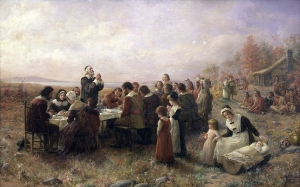Thanksgiving: An Occasion for Agricultural Activism
 I used to hate Thanksgiving. This was in my mid-twenties, when I was coming to grips with the realities of our forebears’ less-than-compassionate treatment of Native Americans. The narrative I’d been told my whole life—that Thanksgiving was a celebration of congenial relations between Pilgrim and Indian—had been proven false, and I was bitter. To me, Thanksgiving was when privileged white people congregated in houses built on land stolen from Native Americans to ignorantly gorge themselves on foods whose propagation would have been impossible without those same Natives, whose warmth and wisdom were rewarded with fraud, disease, and genocide. Like I said, I hated it.
I used to hate Thanksgiving. This was in my mid-twenties, when I was coming to grips with the realities of our forebears’ less-than-compassionate treatment of Native Americans. The narrative I’d been told my whole life—that Thanksgiving was a celebration of congenial relations between Pilgrim and Indian—had been proven false, and I was bitter. To me, Thanksgiving was when privileged white people congregated in houses built on land stolen from Native Americans to ignorantly gorge themselves on foods whose propagation would have been impossible without those same Natives, whose warmth and wisdom were rewarded with fraud, disease, and genocide. Like I said, I hated it.
These days, however, I love Thanksgiving. It’s not that I’ve forgotten the holiday’s true roots—the title ‘thanksgiving’ after all, originates from the name the Massachusetts Bay Colony governor gave to the massacre of 700 Pequot Indians on the morning of their annual Green Corn Festival. It’s that I’ve come to embrace what Thanksgiving is, rather than what it was. It is a once-a-year chance to share a meal with friends and family. It’s also an occasion to promote and spread the joy of wholesome, organic foods.
In my family, Thanksgiving is a collaborative effort. We meet at either my Mom’s or my Aunt Lisa’s, each family member bringing a dish or two. Aunt Lisa, however, always provides the turkey. A stickler about quality, she gets her bird from Bolton Farms, a small, family-owned outfit based in Sellersville. She also insists on providing as many organic/non-GMO side dishes as possible. It’s a tradition she initiated many years ago, when my Thanksgivings were spent stewing silently over the crimes of my forebears. And as the years passed, the rest of the family caught on, giving more consideration to the food they eat—how it was grown, where it came from, etc.
This year, for the first time, I’ll be bringing my own organic dish. Two, actually. Brown rice and butterball potatoes from—where else?—Blue Moon Acres. The ability to share food that satisfies both my high standards for taste, as well as my high ethical standards is a source of deep pleasure. As is the awareness that, in my own small way, I’m casting a vote against conventionally-grown produce.
I may be incapable of rewriting our nation’s brutal history, but I can work to make our present better. I can choose to buy organic, locally-sourced foods; and I can chose to share the good news about those foods. And, little by little, together with friends and family, we can resurrect the great spirit of the Native Americans that was lost so long ago.
